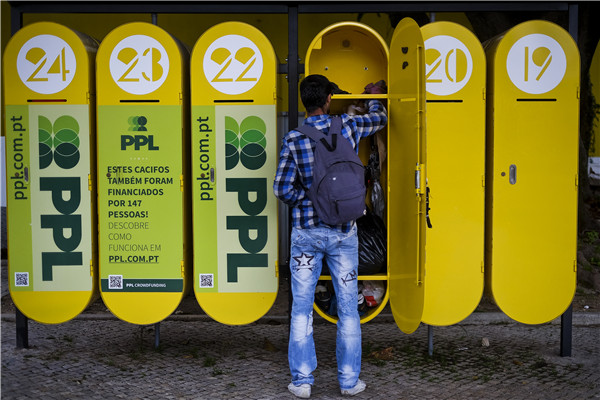Lockers change lives for homeless
 |
|
"Solidarity lockers" are set up by the small charity ACA to make life easier for the city's homeless and help them get back on track. [Photo/Agencies] |
Everything Fabio Ferreira Silva owns fits inside one of the 12 bright-yellow lockers in front of Lisbon's riverside Santa Apolonia rail station.
Silva and other homeless people use the metal cabinets to store their belongings, which they once dragged around the hilly, cobblestone streets of the Portuguese capital in boxes, bags or shopping carts.
"These lockers are very important," he says holding open the door to his locker, where he stores a blanket, clothes, a mobile phone charger, toiletries and personal documents.
The so-called solidarity lockers were set up by the small charity ACA to make life easier for the city's homeless and help them get back on track.
The first dozen lockers-which have an outer slot for mail and a rod to hang clothes-were set up in 2013 in Arroios, a residential neighborhood in central Lisbon with wide boulevards.
Another 12 were put up outside the Santa Apolonia train station last year and the association is waiting for approval from city officials to install 36 more.
Each set of 12 lockers costs 11,700 euros ($12,950) to make and install. Lisbon's city hall covers 60 percent of the cost, with the rest coming from public donations.
A locker-which is 1.8 meters high and 50 centimeters wide-is assigned to a homeless person for one year. Users have 24-hour access to their belongings.
To obtain and keep using a locker, a homeless person has to promise to keep the area around them clean and to stay in regular contact with the ACA's street team.
Members of the squad help locker users obtain documents, get medical treatment, secure a state pension and find housing.
"That is the key to the project's success," says architect Duarte Paiva, who designed the lockers and founded ACA in 2007.
"Having a locker is very important but it is not enough. People need solutions to their problems. Often the homeless are suspicious of social services. This is a way to gain their trust."
















